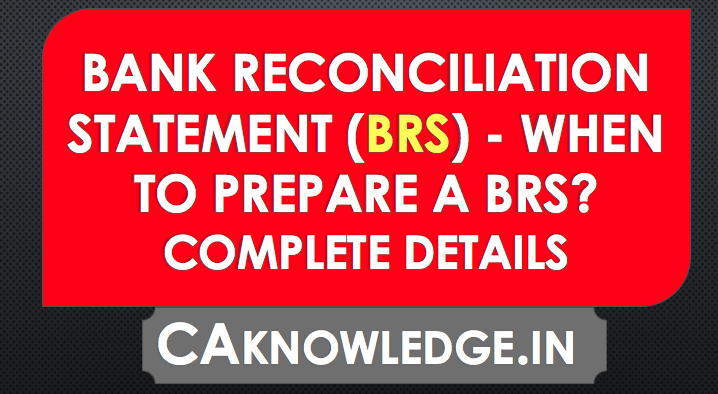Bank Reconciliation Statement (BRS) –To reconcile means to reason or find out the difference between two and eliminating that difference. Whenever we deposit or withdraws money from banks, it is always recorded at two places:-
- Bank column of the cash book; and
- Bank statement (pass book)
The cash book is maintained by the person having the bank account whereas the bank statement is prepared by the bank. Therefore, the balance in both should be equal and opposite in nature. For eg:- if Mr. A deposited Rs 1,00,000 in his bank account it will be recorded on the Dr. side of his cash book, but for the bank it’s a receipt so it will recorded as a Cr. entry in the bank statement or the pass book.
But most of the times these two balances do not match. The reasons for difference in balances can be many and are explained later in this chapter. It is possible to eliminate this difference by matching all the facts and figures of the two statements. The process of eliminating this difference and bringing the two statements in line with each other is known as “Reconciliation” , and the statement which reconciles the bank balance as per cash book with the balance as per the pass book by showing all the causes of difference is known as “BANK RECONCILIATION STATEMENT”.
What does Bank Reconciliation mean?
A bank account or a bank book is maintained by us to record the transactions with our bank. Similarly, the Bank also maintains our account in their books, a copy of which is given to us, commonly known as the Bank statement or updating the passbook. All the transactions recorded by us will also be recorded by the bank, therefore, normally the balance shown by the two books must be the same and should be the opposite balance. But practically, these balances at a particular time don’t generally tally because there is always some time gap between the recording of the same transaction by us and by the bank.
Must Read – Various Types of Vouchers In Accounting
So, to find out the reasons for the differences between the two, we prepare a Bank Reconciliation Statement (BRS). The items which come in Reconciliation Statement, can be grouped in the following four categories.
- Items recorded by the bank but not recorded in our books.
For ex.: Charges charged by the Bank or the Interest credited by the Bank.
- Items recorded by us but not recorded by the Bank. For ex. A cheque deposited but not yet realized
- Errors committed in our books. For ex. Totaling, balancing error, etc.
- Errors committed by the bank, which happens very rarely.
Must Read – Accounting Rate of Return
So, what is a BRS?
Let us have a look on the definition of BRS:
A Bank Reconciliation Statement (BRS)
- is a statement
- on any particular date
- which reconciles the bank book balance & the bank statement balance,
- by writing the items causing difference between the two balances.
The preparation of BRS is not a part of the Accounting Process.
So, Is it necessary that the Bank book & the bank statement balance will always differ?
- Not necessary. They may be the same or may not be the same at any particular point of time.
- However, in reality the two balances on any particular date may not be the same because:
- there may be a time gap in recording the same transaction/ item in these two books,
- as also there may be an error committed by one but not by the other.
Must Read – Double entry system
So, when to prepare a BRS?
- It can be prepared any time, at any periodicity.
- There is no hard & fast rule for the preparation of the BRS.
- But at the end of financial year, BRS must be prepared so that the corrected bank balance will appear in the Final accounts.
What is the significance of a Bank Reconciliation Statement?
- Bank balance as per cash book cannot be accepted as final unless it is supported by statement of passbook. When these two balances do not tally, reconciliation becomes essential to determine the correct bank balance that can be used while finalizing the accounts.
- It acts as a moral check on the staff of the organization to keep the cash records always up to date.
- It helps in finding out actual position of the bank balance.
- It highlights the causes of difference between the bank balance as per cash book and the balance as per pass book. Necessary adjustments can, therefore, be carried out at an early date.
Recommended Articles
